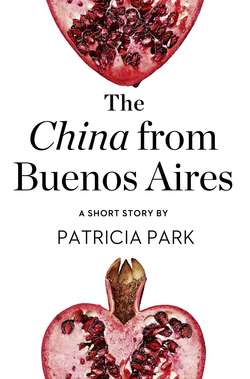Читать книгу The China from Buenos Aires: A Short Story from the collection, Reader, I Married Him - Patricia Park, Patricia Park - Страница 7
ОглавлениеTHE CHINA FROM BUENOS AIRES
PATRICIA PARK
EVERY DAY IN A classroom in Harlem, Teresa would daydream about food: the smoke-filled steakhouses back home, with short ribs drizzled in parsley sauce, charred provolone, and soft white bread etched with grill marks; the pizzerias with their crimped empanadas and thick onion wedges, instead of the thin, floppy slices here with cheese like chewing gum. New Yorkers, it seemed, could not make a decent pizza para nada.
During college lectures on biology and history, her mind wandered back to Argentina as her ears failed to grasp the nasal whine of her professors’ unintelligible English. With the other international students she sat through ESL classes where they listened to cassette tapes of slow, crisp, vacuum-sealed speech that they were made to imitate with wide, exaggerated movements of the mouth.
During breaks the students would cluster by country. Initially the Koreans looked at Teresa’s face and parted their circle; when she opened her mouth and infantile Korean poured out, their circle closed again. A huddle of Hispanic students referred to Teresa as china in the Spanish they thought she could not understand; she told them in her perfect porteño accent, “I’d rather be a ‘chink’ than an indígena.” A fight might have broken out if the students hadn’t been called back to class. From then on they stopped calling her china and started calling her bicha arrogante.
After each class Teresa took a graffiti-covered subway to the Upper West Side diner where she worked off the books, peddling fare like “bagels and lox”, “pastrami on rye” and “coffee regular”. Waiting tables served as a better primer for the English language – in all its uses and misuses – than any of her college classes. After work she would return to the room she shared with two girls from Sri Lanka and China, exchanging no more than a laboured “Hello” and “Goodbye”.
Argentina had fallen on hard times. Coming to America during the fat Reagan years had been her father’s idea, despite Teresa’s protests. Her life was plenty rich in Buenos Aires – she never wanted for friends, boyfriends. At the airport in Ezeiza, her father had kissed her forehead and said, “Better to suffer now while you’re still young. Not when it’s too late like Mamá and Papá.” Her mother had far more practical words: “Don’t get yourself into any trouble.”
For the scores of Koreans who arrived por barco at the port of Buenos Aires, Argentina was only supposed to be a pit-stop to Miguk – literally Land of the Beautiful. They set up shop in Once’s garment district and never left. But for the majority of porteños, the tens of thousands of Korean immigrants and their native-born children were always, simplemente, los chinos.
Three months into her American sojourn, Teresa experienced her first northern winter. This is criminal, she thought each morning as she wound a scarf around her neck and bundled into her too-thin coat. As she stepped outside to face the frost and snow, she tried not to torment herself by imagining the hot summer Buenos Aires was currently enjoying.
Teresa could not find Argentine food in New York, and on one such winter morning she sought out the next best thing: the Korean market in the Queens neighbourhood of Flushing. Growing up, she didn’t care for her mother’s Korean cooking; like every other Argentine kid she favoured milanesas and sándwiches de miga and dulce de leche dripping from everything. Now, picking through the aisles of red pepper flakes and dandelion roots and Napa cabbage, she was so lost in her thoughts that she did not acknowledge the shopkeeper when he addressed her. He had the same hangdog look as her father: cheeks and jowls drooping, as if defeated by gravity. Finally he snapped, “¿Jánguk maldo motjaña?” Can’t you even speak Korean?
Teresa bowed her head and shuffled to the door without replying. In Buenos Aires when the shopkeepers on Avenida Carabobo – the main drag of commerce near the Korean churches – would comment on her terrible Korean, she used to quip back in Spanish: Learn some castellano! But here when she tried to speak, her mouth grew numb. Her only options were bad Korean, bad English, or the perfect Spanish no one would understand.
